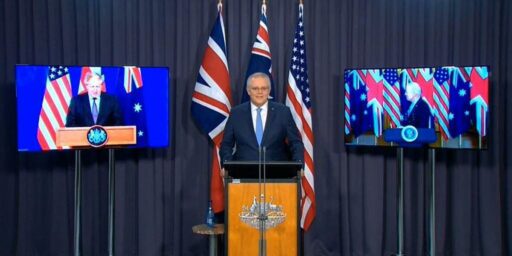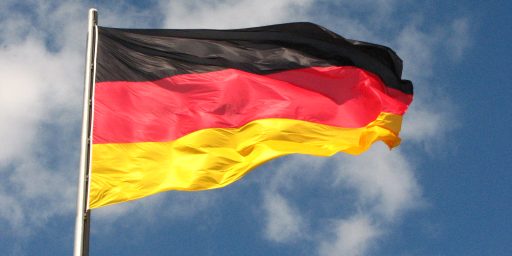BATTLEFIELD EUROPE
BATTLEFIELD EUROPE: Walter Russell Mead has an amusing and inciteful analysis of the Franco-German partnership (via LATimes, requires free registration). I particularly love this passage:
They may be partners, but France and Germany have different visions of what that union should be. Think of France as a kid who loves and knows basketball — how to dribble, shoot and make plays as well as anybody in the world — but who stopped growing at 5 feet, 5 inches. France loves the game of power politics, and it wants to play in the big leagues, but it’s too short for prime time. France hopes the European Union will grow into a superpower that, under French leadership, will challenge the U.S. for world leadership.
That’s not the German way. Stung by losses in two world wars, and with a conscience still scalded by the legacy of the Hitler period, Germany sees the EU as an alternative to power politics, not a new and better way to play the old game. Germany is tired of playing games and thinks that it is high time the human race grew up and got serious about problems like the environment and international law.
Here’s one way to describe the relationship: Together, Germany and France can afford a fancy sports car. Germany spends all its time polishing it and tinkering under its hood. It is a poky driver, never going more than 40 miles an hour — even on the autobahn. This drives France crazy. Why have a sports car if you can’t lay rubber, the French wonder. Why get the car if you aren’t going to go out drag-racing against Uncle Sam?
The piece ends with a sobering thought:
The Bush administration faces two big jobs to keep the battle of Europe from flaring up further. First, it must reward its friends. The leaders who braved public opinion and Franco-German pressure to support the United States in its hour of need should be able to show their fellow citizens the value of good relations with Washington. The Central and Eastern European countries, in particular, must know that the U.S. is a powerful, reliable friend.
Second, the Bush administration must rebuild its relationship with Germany. That will involve some nose-holding on both sides. Germans still don’t like Bush’s unilateralism, warlike rhetoric and talk of preventive war. And there are plenty of people in the Bush administration who will never forgive Schroeder.
But U.S.-German relations remain today what they have been for 50 years — the cornerstone of the Western alliance. Fix that relationship and the rest falls into place. Neglect it and the battle of Europe gets worse — and the U.S., committed to the war on terror, does not need any distractions.
He’s right. He doesn’t offer a strategy for fixing things with Germany, and I don’t have one in mind either. It is necessary, however. And, as I’ve noted many times, doable. While France has long ceased being a reliable partner, Germany and the US are natural allies. The current situation is an aberration mainly owing to Gerhardt Schroeder. My guess is Schroeder’s days (well, months) as Chancellor are numbered. His popularity is already way down from his desperate election gambit and the inevitable defeat of Saddam Hussein will cause support for the war effort to go up precipitously and retroactively.





